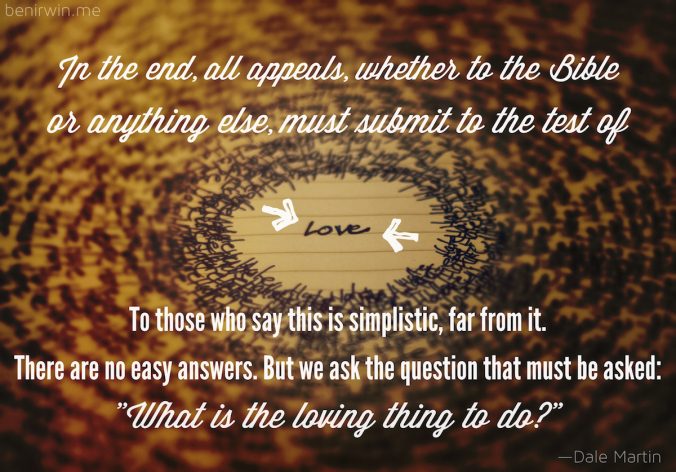
Two blog posts came to my attention yesterday, both focused on the importance of asking the right question, although otherwise on very different topics.
First, Ben Irwin highlighted New Testament scholar Dale Martin’s words quoted in the image above. Determining what the loving thing to do is is not simple or challenging. But it is the right place to focus – not on whether something is “what the Bible says,” since the Bible itself tells us time and time again to prioritize love, and to prioritize people and their needs, over “what the Bible says.” Here’s some more of what Irwin writes (click through for more):
The good news is, the apostle Paul (yes, the same Paul who rather unfortunately suggested that “effeminate” people will not inherit the kingdom of God) gave us the key to answering the age-old question, “How should we live?” And the answer is not “line up as many Bible verses as you can find on a given topic and try to make them all say the same thing.” Because sometimes that doesn’t work.
The answer, according to Paul, is to obey the one command that fulfills all the other, sometimes conflicting commands:
For the entire law is fulfilled in keeping this one command: “Love your neighbor as yourself.”
(He also says, “If you bite and devour each other, watch out or you will be destroyed by each other,” proving that sometimes, applying ancient Scripture IS pretty straightforward.)
Next, Jonathan Bernier emphasized the importance of asking the right questions in the quest for the historical Jesus. Here’s a sample of what he wrote:
Answers can only be as good as the question that they address.Questions mal posées will almost invariably yield mauvaises réponses.
I’ve been thinking about this recently, with regards to historical Jesus studies. Part, perhaps most, of the difficulty in this sub-field of New Testament studies has been the tendency to ask questions mal posées. We typically ask “Did Jesus say or do A or B?” or “Was Jesus A or B?” The problem with the first question is that it is virtually impossible to answer, at least as it has typically been formulated. The way that it has typically been formulated is to functionally assume that we do not know a priori any of Jesus’s activities, and then one-by-one ask whether Jesus did this, or this, or this, or this, each “this” in isolation from each other. This is a quintessential example of what Lonergan describes as pre-scientific thinking, wherein one asks “What is the nature of A?” (i.e.: is X “authentic” or “inauthentic”?), rather than the properly scientific question “How does A relate to B, C, D…?” Asking about the nature of an account, whether it is “authentic” or otherwise, allows one to isolate each account as a datum abstracted from the data pool, and thus to skew the pool so ridiculously that the patently absurd (such as, “Jesus was a Jewish peasant Cynic”) looks possible, even compelling.
Click through to see how he applies this to a specific question about the historical Jesus and his impact.












